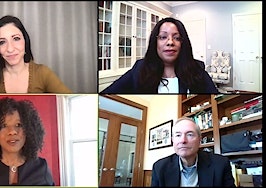When 2020 began, it already promised to be a memorable year. With Trump entering the home stretch of his first term and a crowded field of Democrats still vying for the chance to challenge him, it seemed like politics would dominate the next 12 months.
Who could have guessed, then, that just two months into the year another story would leap onto the headlines and stay there all the way up until now. Politics didn’t go away, of course, but in retrospect the biggest story of 2020 was the coronavirus.
The outbreak has not only killed hundreds of thousands of Americans, but it also brought the economy to its knees via soaring unemployment and isolation mandates. Some industries, including real estate, have seen strong recoveries, but overall the things that happened in 2020 would have sounded absurdly far-fetched if someone had predicted them last year.
All of which is to say, there was too much news this year to review everything. However, here are the biggest stories that dominated the news, and defined real estate.

Credit: Chris Jackson, Harry How, Scott Olson, Getty Images and Jim Dalrymple II
In the news: January began simply enough. Early in the month, Julian Castro exited the presidential race while Elizabeth Warren, Bernie Sanders, Pete Buttigieg and Joe Biden were sitting atop a still-crowded field of contenders. The first Democratic debate took place on Jan. 15, but Biden — who would go on to win the presidency — was generally overshadowed at the time.
Aside from political news, January was also the month that Prince Harry and Meghan Markle announced they were stepping back as senior members of the British royal family. Finally, the month wrapped up with the tragic death of basketball legend Kobe Bryant.
Coronavirus: The U.S. Centers for Disease Control (CDC) announced on Jan. 21 that they had detected the first case of the novel coronavirus in the U.S. Days later, on Jan. 30, the World Health Organization declared a global health emergency over the outbreak. Still, for most people in North America, the coronavirus still seemed like a distant threat in January.
And as you can see from the chart below, which is based on data from the CDC, January barely even shows up (though the data range on the vertical axis hints at where this is going).

Credit: CDC data, Jim Dalrymple II
Real estate: January was relatively normal in the real estate world, with issues like the prior year’s anti-pocket listing Clear Cooperation Policy still dominating the conversation. Forecasts at the time also tended toward the conventional; for example, Blackstone’s CEO predicted coming demand for urban real estate — a reasonable enough idea at the time, but one that didn’t pan out thanks to the pandemic.
In other news, Realogy shuttered Climb, the brokerage it bought three and a half years earlier and Zillow — whose CEO Rich Barton topped the Swanepoel Power 200 list — expanded its iBuying in Arizona.
And though it feels like a lifetime ago, Inman also held its last in-person event before the pandemic in January.

Credit: Kena Betancur, Mark Wilson, Justin Sullivan, Stringer, Getty Images and Jim Dalrymple II
In the news: The U.S. House of representatives impeached Trump in December, and he faced a U.S. Senate trial beginning in January. But the saga finally came to a conclusion on Feb. 5 when the Senate acquitted Trump.
In other political news, Democrats held three debates in February and a handful of second and third tier candidates — the most prominent of whom was probably entrepreneur Andrew Yang — dropped out of the race.
The final days of February also saw a jury convict disgraced Hollywood producer Harvey Weinstein on rape and sex crime charges. The conviction was a kind of culmination of the Me Too movement, which gained steam in 2017 after allegations against Weinstein began making headlines.
Coronavirus: The true threat the coronavirus posed to the U.S. was still not totally clear in February, though it was ravaging many other countries. However, on the last day of February officials confirmed that the outbreak had killed a person in Washington. At the time, the fatality was the first known death in the U.S. from the pandemic, though researchers later discovered that two earlier deaths in February were also connected to COVID-19.
Fears about the pandemic also set off a stock sell of in February.

Credit: CDC data, Jim Dalrymple II
Real estate: When February began, pocket listings were still in the news, and midway through the month Keller Williams made headlines for ending lifelong profit sharing for associates who jump ship to other companies. WeWork got a new CEO in February, five months after company founder Adam Neumann stepped down amid growing criticism.
But it wasn’t long before the coronavirus started to weigh on the industry.
One week into February, the outbreak was already seemingly dampening demand from China. As the month wore on the stock market tanked further, dragging down major real estate companies such as Realogy, which saw the value of its shares fall by 16 percent, and Zillow. Around the same time, brokerages began including so-called “coronavirus clauses” in their contracts to protect clients whose deals were tripped up by the outbreak.

Credit: Spencer Platt, Mario Tama, Getty Images and Jim Dalrymple II
In the news: March was when the coronavirus really exploded in the U.S., so it’s tough to untangle the broader news cycle from the outbreak-havoc. However, some notable non-COVID headlines included Democratic presidential hopeful Amy Klobuchar suspending her campaign on March 2, followed days later by Super Tuesday. Biden dominated his party’s primaries, foreshadowing his later campaign successes. And later in the month he picked up the endorsement of Kamala Harris.
Coronavirus: On March 11, the World Health Organization declared the coronavirus a global pandemic. Trump banned travel from Europe the same day, and two days later declared a national emergency. Despite his declaration, Trump also spent March downplaying the virus and claiming it was under control.
March also marked the first month when the economic toll of the pandemic began to come into focus. “Social distancing” went mainstream, with experts at the time suggesting it could last “months.” By March 19, states such as California had issued stay-at-home orders, which in turn forced businesses to shut down. And that lead to soaring unemployment numbers.
The stock market also took a beating in March. Though stocks did start dropping in February, March saw several massive sell offs, the largest of which took place on March 16. That day marked the second worst plunge in U.S. history. The overall result was the most significant drop in the market since the 1929 crash that kicked off the Great Depression.
By the end of the month, lawmakers managed to pass the CARES Act, which included an array of relief programs for individuals and businesses. The law was the largest economic relief package of its kind in U.S. history.
Trump also said in March that he wanted to reopen the economy by Easter.

Credit: CDC data, Jim Dalrymple II
Real estate: Three days into March, the Fed issued an emergency interest rate cut amid the growing economic threat of the coronavirus, and record low mortgage rates soon followed. At the same time, Realogy asked employees to stop non-essential travel and a slew of real estate firms began floating the idea of postponing, canceling or otherwise modifying in-person events. The National Association of Realtors (NAR) canceled two of its conferences and made another one virtual.
March also saw the beginning of eviction and foreclosure moratoriums. Social distancing additionally forced open houses to stop in many places.
As the crisis continued to worsen, Zillow, Redfin, Realogy and Opendoor all temporarily halted their iBuying efforts in March.
Finally, widespread layoffs began in March, with Compass letting go of 15 percent of its staff and Airbnb-backed Lyric firing all of its 100-person team. Airbnb itself undertook drastic cost-cutting measures, but hadn’t yet opted for widespread layoffs in March.

Credit: Alex Wong, Mark Wilson, Chip Somodevilla, Getty Images, James Yarema, Unsplash and Jim Dalrymple II
In the news: After a fairly inauspicious start to his campaign, Biden managed to effectively secure the Democratic nomination for president on April 8 when Bernie Sanders — his last remaining serious challenger — threw in the towel. Sanders endorsed Biden several days later. Biden continued picking up significant endorsements, such as from U.S. House Speaker Nancy Pelosi, as the month wore on.
Late April also saw the U.S. Navy release footage of unidentified flying objects, tantalizing alien enthusiasts everywhere.
Coronavirus: Two days into April, the worldwide count of coronavirus cases hit 1 million. That same day, the outbreak prompted Democrats to postpone their convention, moving it from July to August.
New York — an early epicenter of the virus — saw soaring case and death counts in April, with hundreds of new fatalities reported daily. Other states also began to see quickly rising infections as well.
The shuttering of service, travel, entertainment and other industries also led to millions upon millions of unemployment claims. Numbers released on April 2 showed 6.6 million Americans requested assistance, followed by another 6.6 million the next week. The numbers went down as the month progressed, but data from the U.S. Bureau of Labor Statistics shows the unemployment rate ultimately peaked in April, hitting 14.7 percent.
On April 10, the U.S. death toll from the pandemic had just topped 18,000. However, by the end of the month, the U.S. passed 60,000 deaths — a number that at the time was shocking.

Credit: CDC data, Jim Dalrymple II
Real estate: The real estate job market continued taking a hit, with Redfin furloughing 41 percent of its agents on April 7, eXp Realty laying off 15 percent of its staff on April 8, and Opendoor dismissing 15 percent of its staff on April 15.
Many thousands of other agents at scores of brokerages were also forced to work from home, which in some cases initially meant not working at all.
Mortgage rates continued dropping in April, which helped fuel exploding demand for refinancing.
By the end of April, many states and cities had banned evictions and foreclosures. Some areas went further and froze rents as well. The rules were meant to counter widespread unemployment that peaked in April.
Meanwhile, small businesses began to receive stimulus cash in April, with real estate firms collectively nabbing $8 billion from the Paycheck Protection Program.

Credit: Christopher Furlong, Chip Somodevilla, Carl Court, Getty Images, Opendoor and Jim Dalrymple II
In the news: Probably the most significant non-COVID news in May was the death of George Floyd. A Minneapolis police officer killed Floyd after kneeling on his neck for more than nine minutes, and the incident sparked ongoing protests across the U.S. The protests focused on racial justice and policing and were one of the few events from 2020 that at their height could rival the pandemic in terms of attention.
Coronavirus: The virus continued spreading rapidly in the U.S., though it was also in May that states gradually began relaxing stay-at-home orders and isolation mandates. There was a sense at the time that the worst of the outbreak may be passing and that the U.S. could be headed toward a slow but straightforward path to recovery.
Of course, that proved not to be the case. On May 21, the number of cases around the world passed 5 million. And a week later, the U.S. hit 100,000 COVID-related deaths.
At the same time, relief efforts stalled out in Congress. Though the U.S. House passed the $3 trillion HEROES Act on May 15, Republicans called it dead on arrival in the Senate. The bill never moved further, and the incident proved to be a harbinger of the congressional deadlock that would kill future efforts to fund relief as well.

Credit: CDC data, Jim Dalrymple II
Real estate: Major layoffs continued into a third month in May, with Airbnb announcing on May 7 that it was letting go of nearly 1,900 people. Douglas Elliman and Realtor.com operator Move also both revealed major layoffs in May.
Despite the ongoing chaos, however, Zillow, Redfin and Opendoor all resumed their iBuying programs in May. Redfin also began bringing back furloughed agents, and reports began to trickle in suggesting the bottom of the real estate market had already passed.
Evidence also began piling up that with new remote work options, real estate buyers were looking for further-flung homes in non-urban areas.
Agents — as opposed to just brokerages — were also receiving money from the Paycheck Protection Program in May.

Credit: Clay Banks, Teddy Österblom, Mark Wilson, Alex Wroblewski, Unsplash, Getty Images and Jim Dalrymple II
In the news: Protests following the death of George Floyd continued into June. As the protests grew more violent, dozens of cities and states imposed curfews.
Coincident with the protests, many Americans in late spring were calling for the removal of Confederate statues.
Early June also saw former Defense Secretary James Mattis denounce his former boss, President Trump. Even years into the norm-busting Trump administration, Mattis’ condemnation was shocking.
Coronavirus: Even as other parts of the U.S. were still struggling with their own outbreaks, New York City gradually began reopening in June, following a multi-month lockdown period.
Despite that small bit of good news, however, federal officials in early June also announced that the U.S. economy had entered a recession. The recession technically began in February, though officials didn’t make the call until June 8. The downturn marked the end of the longest period of economic expansion since World War II.
By the end of June, the pandemic’s total global death toll rose to above 500,000. In the U.S., there had been more than 2 million cases by the end of June, as well as nearly 130,000 deaths.

Credit: CDC data, Jim Dalrymple II
Real estate: By early June, the protests following the death of George Floyd were prompting a discussion about race and discrimination in the real estate industry.
Also in June, concerns about leadership at the National Association of Gay and Lesbian Real Estate Professionals (NAGLREP) boiled over into a public controversy. The issue initially stemmed from founder Jeff Berger’s social media comments. However, NAGLREP members soon raised questions about Berger’s oversight of the organization, and eventually scores of members resigned in protest.
In COVID-related real estate news, Realogy began bringing furloughed employees back in June. The number of mortgages in forbearance also fell, suggesting that even if the health crisis was growing, the situation in real estate was improving.

Credit: Alex Wong, Scott Cunningham, Getty Images, ismail mohamed – SoviLe, Clay Banks, Unsplash and Jim Dalrymple II
In the news: Coronavirus continued dominating the news in July. However, other notable events included the death of Rep. John Lewis, a civil rights leader and long-serving member of congress, and ongoing Black Lives Matter protests. Sporting events including baseball were also happening in July. But thanks to the coronavirus, games mostly took place against a backdrop of empty stadiums.
Coronavirus: After months of closed borders, Europe finally began welcoming travelers again on July 1. But unfortunately for Americans hoping to escape the situation at home, Europe continued barring entry for U.S. citizens.
July 1 also saw the U.S. pass a grim threshold: For the first time since the pandemic began, the country saw 50,000 new cases reported on a single day. Around the same time, various states continued grappling with their own worsening outbreaks. In Texas, for example, Gov. Greg Abbott issued a mandatory mask order on July 2. And on July 4, Florida reported a record-breaking 11,458 new cases in a single day.
The takeaway at this time was that despite a possible (small) bump in optimism in the spring, by mid summer it was becoming increasingly clear that the pandemic wasn’t going away as quickly as many had expected or hoped.

Credit: CDC data, Jim Dalrymple II
Real estate: By July, it was clear that the housing market had roared back to life after stalling in the spring. Mortgage rates were still extremely low, agents reported feeling optimistic, and bidding wars intensified as more buyers looked to move amid low inventory.
Still, some corners of the industry were only limping along. Vacancy rates in New York hit a 14-year high point, a third of all Americans missed their July housing payment, and experts worried about a new crisis as eviction moratoriums expired.
Aside from the pandemic, an exhaustive investigation from Inman uncovered allegations that leaders at real estate data firm Remine had cultivated a toxic and unprofessional work environment.

Credit: Alberto E. Rodriguez, Scott Olson, Eric Thayer, Getty Images, Marcus Kauffman, Unsplash and Jim Dalrymple II
In the news: The bad news just kept coming in August. In western states, wildfires scorched more than 1 million acres. One fire alone would eventually become the largest ever in California history, while two others would land in the state’s top-ten biggest blazes.
On Aug. 4, a massive explosion rocked Beirut, leveling a large section of the city’s waterfront and causing extensive damage. At least 200 people died in the blast.
Meanwhile on the Gulf Coast, Hurricane Laura made landfall on Aug. 27. The storm eventually killed at least 16 people.
In other news, Marvel fans around the world were shocked on Aug. 29 when Black Panther star Chadwick Boseman died following a struggle with colon cancer. He was only 43 years old.
On the political front, Biden chose Harris as his running mate on Aug. 11.
Coronavirus: Only a week into August, the U.S. surpassed 5 million cases. As shocking as that number was, by the end of the month the country topped 6 million. The U.S. had also suffered more than 180,000 deaths by the end of August.
More promisingly, however, the Trump administration announced on Aug. 11 that it had reached a deal with drug maker Moderna for 100 million vaccines.

Credit: CDC data, Jim Dalrymple II
Real estate: After much speculation, Quicken Loans‘ parent Rocket Companies held an initial public offering (IPO) on Aug. 7. The company’s shares hit nearly $25 out of the gate, but fluctuated by a few dollars over the next month. Since September, shares have generally traded in the $20 range.
Airbnb, which was itself inching toward an IPO at the time, issued a global ban on parties in an effort to combat the spread of COVID-19.
By August, Zillow and Opendoor had resumed iBuying in all of their pre-pandemic markets. The latter firm also spent August looking for agents for its Opendoor Brokerage business.
Meanwhile evidence kept trickling in that amid the pandemic, consumers were looking for bigger, and often suburban, homes.

Credit: Mark Wilson, Dimitrios Kambouris, Getty Images, Isaac Quesada, Thom Milkovic, Unsplash and Jim Dalrymple II
In the news: As the presidential race continued heating up, long-serving Supreme Court Justice Ruth Bader Ginsberg died on Sept. 18. Ginsberg was a hero to many on the left, and her death suddenly threw a wildcard into a contentious political atmosphere. Though Democrats quickly pointed out that Republicans denied President Obama a Supreme Court appointment because he was in the final year of his presidency, they reversed course after Ginsberg’s death and immediately vowed to move forward with Trump’s eventual nominee.
Wildfires also continued ravaging the West in September, with the Creek Fire in California growing into the state’s fourth largest blaze in recorded history. Eerie photos also began surfacing of San Francisco shrouded in orange wildfire smoke.
Coronavirus: By the end of September, the U.S. passed more than 7 million coronavirus cases. The global death toll also marched past 1 million. The U.S. death toll rose above 200,000 in September.
September also saw the release of a new book on Trump from veteran journalist Bob Woodward. The book made headlines for revealing that Trump said earlier in the year that he had intentionally downplayed the threat of the coronavirus.

Credit: CDC data, Jim Dalrymple II
Real estate: September began with a federal eviction ban, which extended through Dec. 31.
Two weeks later, Opendoor revealed that it planned to go public by merging with a special purpose acquisition company, also known as a SPAC or blank-check company. Around the same time, well-known agent and reality TV star Ryan Serhant left his longtime company Nest Seekers International to form his own brokerage, which he dubbed Serhant.
Zillow also announced in September that it planned to hire agents as employees for its iBuyer transactions.
Additionally, the Pew Research Center revealed that 52 percent of young adults in the U.S. were living their their parents. That was up from only 47 percent in February, before the pandemic swept the U.S., and was the highest percentage since the Great Depression.

Credit: Drew Angerer, Tasos Katopodis, NASA, Spencer Platt, Getty Images and Jim Dalrymple II
In the news: The last full month before the U.S. presidential election, October was dominated by political news. The final debate took place in the latter half of the month, and days later — and just over a month after the death of Ginsberg — the Senate confirmed Amy Coney Barrett to the Supreme Court. Votes mostly split along party lines.
Aside from politics, on Oct. 25 Pope Francis made Archbishop Wilton Daniel Gregory a cardinal in the Catholic Church. Gregory is the first African American cardinal in history.
Finally, NASA announced in late October that for the first time it had identified water on sunlit parts of the Moon’s surface. Scientifically, the announcement was significant, though some mocked the agency for overhyping news that fell short of first contact with aliens.
Coronavirus: Politics and the pandemic converged in new ways in early October when a number of White House officials got COVID-19. The diagnoses culminated with Trump testing positive on Oct. 2. Trump was eventually flown to Walter Reed Medical Center, where he received an experimental drug treatment.
By the end of October, the U.S. had seen more than 9 million documented cases of COVID-19. Also at the end of the month, the U.S. Food and Drug Administration approved Remdesivir as the first drug to treat the virus.

Credit: CDC data, Jim Dalrymple II
Real estate: Early in October, a judge denied NAR’s request to toss out a lawsuit that takes aim at the practice of sellers paying buyers’ agents’ commissions. NAR also proposed a sweeping new code of ethics for Realtors in October that would govern behavior outside of real estate-related activities.
A number of firms posted strong earnings reports in October, but Realogy was a particular standout, with the company seeing it’s biggest third quarter ever. Those earnings, along with continuing record-low interest rates, hinted at the ongoing strong recovery the housing market experienced in later 2020.
Toward the end of October, Compass expanded in Hawaii, ending a two-year hiatus on geographic expansion. And a group of housing advocates sued Redfin over what they said were discriminatory pricing practices.

Credit: Mark Makela, Amanda Edwards, NAR, CoStar, Getty Images and Jim Dalrymple II
In the news: The biggest news in November was Biden winning the presidency. Though the outcome wasn’t clear until several days after the election — and Trump has still refused to concede as of the time of this writing — days of ballot counting made clear that Biden had managed to flip several formerly red states. His lead in the popular vote eventually grew to more than 7 million.
Several days after the election, Trump’s lawyer and former New York City Mayor Rudy Giuliani held a press conference in Philadelphia where he made claims about voter fraud. Though the claims were widely dismissed, the event was mocked for being held at Four Seasons Total Landscaping, a local business that the Trump campaign seems to have mixed up for the similarly named high-end hotel chain.
Aside from politics, longtime Jeopardy host Alex Trebek died on Nov. 8, prompting an outpouring of condolences from fans.
Coronavirus: Despite all the political chaos, November also saw some of the best, unmitigated good news of the pandemic: Drug makers Pfizer and Moderna both said they had developed COVID-19 vaccines that were more than 90 percent effective. Dr. Anthony Fauci, who has been leading the U.S. coronavirus response, said the vaccines performed beyond expectations and indicated they could help the country get to something resembling normal by fall of 2021.
Still, by the end of November the U.S. had seen more than 1.3 million COVID-19 cases and more than 267,000 deaths.

Credit: CDC data, Jim Dalrymple II
Real estate: The National Association of Realtors (NAR) had an active November. Early in the month, the trade organization announced a new self-testing program meant to root out discrimination. Days later, it approved a controversial code of ethics meant to crack down on discriminatory speech and behavior. And finally on Nov. 19, it formally apologized for past policies that contributed to discrimination.
The U.S. Department of Justice also announced a lawsuit, and settlement, with NAR over policies that government regulators said were anti-competitive.
Aside from NAR, CoStar revealed in late November that it had acquired Homesnap for $250 million, and Airbnb formally filed to go public, revealing in the process that it suffered huge losses in the early days of the pandemic.

Credit: Rich Polk,Suhaimi Abdullah, Airbnb, Redfin, Getty Images and Jim Dalrymple II
In the news: December isn’t over yet, but in keeping with the general theme of 2020, it has continued to be a big month for news. Most significantly, despite Trump’s ongoing refusal to concede the election, a series of events further strengthened evidence of Biden’s win. Among those events was a recount in Georgia that reaffirmed the Democrat’s victory in the state for a third time, and a statement from Trump’s Attorney General Bill Barr indicating that there was no evidence of voter fraud that would change the election’s outcome.
In the entertainment world, Elliot Page — who starred in the movie Juno and formerly used the name Ellen Page — came out as transgender on Dec. 1.
Coronavirus: On Dec. 8, the U.S. passed 15 million positive coronavirus cases. The country has also seen more than 285,000 deaths over the course of the pandemic. The U.S. had its highest daily death toll on Dec. 2, with more than 2,800 reported fatalities.
The vaccines continued to offer a bit of light at the end of the tunnel; the U.K. actually began distributing the vaccines on Dec. 8, and on Dec. 14, the first vaccine shots were given in the U.S. But the rising case and death counts in the U.S. proved that the crisis was far from over.

Credit: CDC data, Jim Dalrymple II
Real estate: After a rollercoaster year in which it saw massive layoffs, huge losses, and finally significant profits, Airbnb went public on Dec. 10. One day prior to its stock market debut, the company had aimed for a $47 billion valuation. But share prices skyrocketed when trading began, propelling the company’s value to more than $100 billion.
Soft Bank — a massive investment fund that has backed Opendoor, WeWork, Compass and other high-profile firms — benefited in December from a successful IPO of food delivery company DoorDash, and from the pending public debut of Opendoor.
A number of iBuyers expanded into new markets in late 2020, but perhaps the most notable of those expansions was Redfin’s move into San Francisco and Seattle — two pricey markets that could test the iBuying business model.













